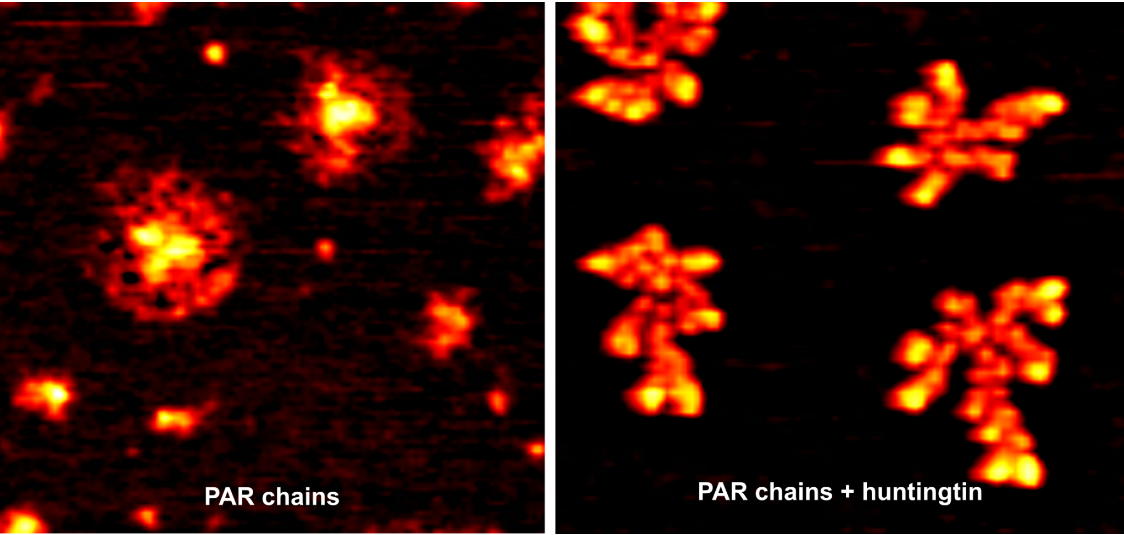Researchers at McMaster University have found that the mutated protein in Huntington's disease patients disrupts DNA repair as it should, which affects the capacity of brain cells to regenerate.
 Atomic force microscopy image of poly ADP-ribose (left) and poly ADP-ribose bound by the huntingtin protein (right). Image Credit: McMaster University
Atomic force microscopy image of poly ADP-ribose (left) and poly ADP-ribose bound by the huntingtin protein (right). Image Credit: McMaster University
The study was published in the journal Proceedings of the National Academy of Sciences (PNAS). It discovered that the huntingtin protein aids in the synthesis of unique molecules crucial for repairing DNA damage. Poly [ADP-ribose] (PAR) molecules assemble around damaged DNA and act as a net to draw in all the components required for the repair process.
However, the study discovered that the mutant form of this protein is unable to stimulate PAR production in individuals with Huntington's disease, which ultimately leads to less effective DNA repair. The research expands upon a 2018 finding by researchers at McMaster's Truant Lab that described the role of the huntingtin protein in DNA repair.
We looked at the PAR levels in the spinal fluid from Huntington’s Disease patients and expected it would be higher due to the higher levels of DNA damage, but we actually found the opposite. The levels were quite a bit lower and not only in Huntington’s Disease samples but also in people who carry the gene but aren't yet showing outward symptoms.”
Tamara Maiuri, Study Lead Author and Research Associate, McMaster University
Researchers have previously discovered elevated PAR levels in patients with other neurodegenerative disorders, such as Parkinson's and Amyotrophic lateral sclerosis (ALS), so this was an unexpected discovery.
A genetic condition known as Huntington’s disease damages the brain and causes nerve cells to deteriorate gradually. There is a 50% chance that children of parents with Huntington's disease will inherit the gene.
Future Studies on Huntington’s and Cancer Research
This finding has a special bearing on the study of cancer. Senior study author Ray Truant, a Professor in McMaster's Department of Biochemistry and Biomedical Sciences, notes that PARP inhibitors are medications that block the synthesis of PAR and are used to treat cancer.
According to Truant, this could provide an evolutionary advantage for the human population by preventing cancer in infancy, which could account for the long-standing finding that people carrying the Huntington's Disease gene have much lower cancer rates.
One implication is that new huntingtin-level lowering drugs already in clinical trials may have utility outside of Huntington’s Disease to cancer. Based off the findings in this paper, we are working in collaboration with Sheila Singh’s lab at McMaster University's Centre for Discovery in Cancer Research to investigate the potential further.”
Ray Truant, Senior Study Author and Professor, Department of Biochemistry and Biomedical Sciences, McMaster University
Future research, according to researchers, ought to examine various classes of FDA-approved PARP1 inhibitor medications, as they may be promising not only for Huntington's disease but also for other neurodegenerative illnesses.
Source:
Journal reference:
Maiuri, T., et al. (2024) Poly ADP-ribose signaling is dysregulated in Huntington disease. Proceedings of the National Academy of Sciences. doi.org/10.1073/pnas.2318098121